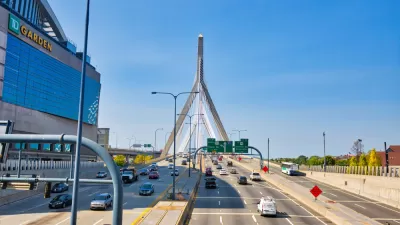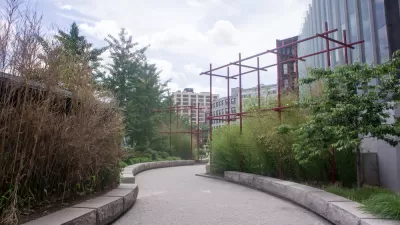Completed years ago, the true cost of Boston's "Big Dig" is finally being tallied. Unfortunately, for residents of Massachusetts, the tab is far from paid, imperiling funding for other necessary transportation projects, reports Eric Moskowitz.
At a legislative committee hearing held earlier this week, Dana Levenson, chief financial officer for the Massachusetts Department of Transportation, delivered the sobering tally of the full cost of the project that buried Interstate 93 through downtown Boston. With the total cost of the project and associated public transit improvements exceeding $24 billion, with interest, the state still owes $9.3 billion in principal and interest on the Big Dig and the completed transit commitments, reports Moskowitz.
The project, and the money still owed, continues to have a significant impact on Massachusetts's finances, "limiting the state's ability to pay for other transportation
infrastructure projects and even day-to-day highway and transit
operation by gobbling up so much money for debt," writes Moskowitz.
While officials were quick to praise the overall successes of the project, its notoriously spiraling costs continue to plague the state. "It is extremely important that we understand the effect that the Big
Dig debt service has on overall transportation spending in
Massachusetts," said Representative David P. Linsky, committee chairman
and a Natick Democrat. "We're paying over $100 million a year in Big Dig
debt service, and that is obviously $100 million that we can't spend on
other transportation needs."
FULL STORY: True cost of Big Dig exceeds $24 billion with interest, officials determine

Americans May Be Stuck — But Why?
Americans are moving a lot less than they once did, and that is a problem. While Yoni Applebaum, in his highly-publicized article Stuck, gets the reasons badly wrong, it's still important to ask: why are we moving so much less than before?

Using Old Oil and Gas Wells for Green Energy Storage
Penn State researchers have found that repurposing abandoned oil and gas wells for geothermal-assisted compressed-air energy storage can boost efficiency, reduce environmental risks, and support clean energy and job transitions.

Placekeeping: Setting a New Precedent for City Planners
How a preservation-based approach to redevelopment and urban design can prevent displacement and honor legacy communities.

San Francisco’s Muni Ridership Grew in 2024
The system saw its highest ridership since before the Covid-19 pandemic, but faces a severe budget shortage in the coming year.

Colorado Lawmakers Move to Protect BRT Funding
In the face of potential federal funding cuts, CDOT leaders reasserted their commitment to planned bus rapid transit projects.

Safe Streets Funding in Jeopardy
The Trump administration is specifically targeting bike infrastructure and other road safety projects in its funding cuts.
Urban Design for Planners 1: Software Tools
This six-course series explores essential urban design concepts using open source software and equips planners with the tools they need to participate fully in the urban design process.
Planning for Universal Design
Learn the tools for implementing Universal Design in planning regulations.
Heyer Gruel & Associates PA
City of Moreno Valley
Institute for Housing and Urban Development Studies (IHS)
City of Grandview
Harvard GSD Executive Education
Salt Lake City
NYU Wagner Graduate School of Public Service
City of Cambridge, Maryland




























